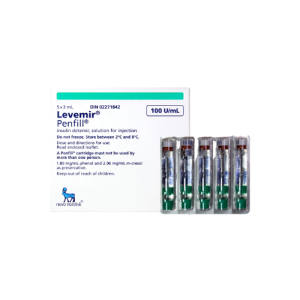What is Levemir (insulin detemir)?
Levemir falls under the category of long-acting insulin and it is the brand name for insulin detemir. It’s a prescription drug used for long-term management of type 1 diabetes. Levemir is absorbed into the body over a 24 hour period, hence your blood glucose level can be controlled for a longer time than with a short-acting insulin. This medication can be used by a patient who is above two years of age, although one is at risk of its side effects, like when taking any other medication. It’s given through injections using a pre-filled, disposable Levemir flex touch pen once or twice daily. If taking the drug once, administer the shot around your bedtime or after your evening meal. On the other hand, if you are taking it twice a day, inject the first dose in the morning and the next dose in the evening, after meals. Your doctor may simply advise you to take it 12 hours after the morning shot. The drug is used in combination with short-acting insulin to manage blood sugar immediately after a meal and to help treat diabetic ketoacidosis.
Levemir side effects
Some common negative the drug reactions may be experienced for a couple of weeks or days until your body gets used to the drug.
These common negative effects include:
- Injection site reactions such as pain, swelling and irritation
- Swelling of the hands or feet
- Skin thickening on the injection area
- Weight gain
- Headache
- Back pain
- Stomach pain
- Flu symptoms
- Cold symptoms like stuffy nose, sneezing, and sore throat
In most cases, the insulin Levemir side effects mentioned above don’t require medical attention and usually resolve on their own. However, if they are persistent, severe, or become bothersome, contact the doctor for some tips to help manage the troublesome Levemir side effects. Nevertheless, some unwanted effects of the medication are severe and need immediate medical intervention. If left untreated, they can lead to serious complications, so check with the physician if any of these more serious effects occur:
- Allergic reactions like sweating, fast heart rate, trouble breathing, wheezing, itching and skin rash over the entire body.
- Low potassium levels characterized by confusion, uneven heart rate, extreme thirst, increased urination, leg discomfort and muscle weakness.
- Unusual tiredness
- Seizures
You should take the dose only as directed by the doctor to avoid a Levemir overdose, or side effects like life-threatening hypoglycemia, which is characterized by a headache, hunger, weakness, sweating, tremors, irritability and trouble concentrating.
How to inject
Insulin detemir should be injected subcutaneously. Your doctor will show you the best way to inject levemir. Usually, it is injected into the fat tissue of the upper arm, thigh, buttock or abdomen. Do not inject this insulin if you do not know how to properly administer it. If your doctor prescribes a short acting insulin together with insulin detemir, you should inject them separately.
Precautions
Before using Levemir injection, inform the doctor of any existing medical conditions or existing allergies you may have. Don’t leave out information about the medication you are taking, if you are pregnant or breastfeeding, and other important facts concerning your health because these factors may affect how you can use this medication.
If you are using insulin, you should consistently monitor your blood glucose levels as guided by a diabetes educator, especially when under stress, ill, or when your insulin dose and schedule changes. If the results of each blood test constantly indicate high or low blood sugar levels, contact the health care practitioner.
The fatty tissue under the skin at the injection area may shrink or thicken if you give the shot at the same spot too often. To avoid this negative effect, rotate the injection area with each shot.
Many things that affect your blood sugar levels can change your insulin requirements, such as:
- Medical conditions, including infections, thyroid conditions, liver and kidney disease
- Some drugs that may increase or decreases blood sugar levels
- Diet, exercise, illness
- Injury
- Stress
- Surgery
Educate your family and friends on the symptoms of low blood glucose (hypoglycemia) and how to use a glucagon kit in case you pass out or experience serious low blood sugar levels.
High blood sugar levels (hyperglycemia) can be triggered by a low dose or a missed dose of Levemir. Remember, if left untreated, hyperglycemia can eventually cause diabetic ketoacidosis, which is a severe condition.
In Conclusion
This medication is well known for controlling or managing the blood sugar levels of type 1 diabetics effectively; however, be vigilant on monitoring Levemir flex-touch side effects.
—






